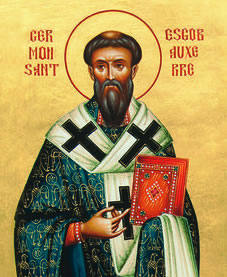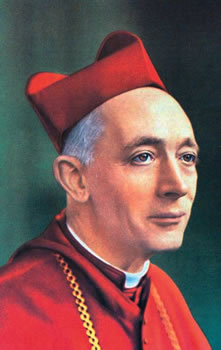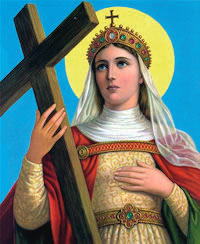August Saints
 Saint Germanus of Auxerre (c.380-450)
Saint Germanus of Auxerre (c.380-450)
Romanus was born of a noble family around 380. After the very best in education, he went to Rome, studying eloquence and civil law. He practised there for some years with great success, eventually marrying the highly esteemed Eustachia. The emperor sent him back to Gaul, entrusting him with the government of the Gallic provinces. He resided at Auxerre where his pleasure-filled life incurred the displeasure of the bishop, St Amator, who, under unusual circumstances, duly bestowed on him the tonsure.
An immediate, wonderful change occurred in Germanus and he accepted everything that had happened as the Divine will. He gave himself up to prayer, study, and works of charity, and, when Amator died in 418, Germanus was unanimously chosen to fill the vacant see. His splendid education now served him in good stead in the government of the diocese, which he administered with great wisdom. He distributed his goods among the poor, and practised great austerities.
In 431, Germanus was sent to Britain to combat Pelagianism. Six years later, he revisited, reportedly doing much for the Church. On his return to Gaul, he proceeded to Armorica (Brittany) to intercede for the Armoricans who had been in rebellion. Their punishment was deferred at his entreaty, till he should have laid their case before the emperor. He set out for Italy, sought and obtained their pardon and died there in 450.
Saint Germanus, teach us to seek the truth always.
(Source: http://www.newadvent.org/cathen/06472b.htm)
Saint Helena was born probably in Bithnyia to a poor family of low social status. She married Constantius Chlorus, by whom she was the mother of the emperor Constantine the Great, and became a Christian in 313.
She was most liberal in alms and was responsible for the building of many churches, especially in Palestine. Her name is traditionally associated with the finding of the True Cross in a rock-cistern near Mount Calvary.
Saint Helena, give us a love of the cross of Jesus.
(Source: A New Dictionary of the Saints, Donald Attwater. 1993 Burns & Oates, Kent)
 Blessed Alfredo Ildefonso Schuster (1880-1954)
Blessed Alfredo Ildefonso Schuster (1880-1954)
Alfredo Ludovico Luigi Schuster was born in Rome on 18 January 1880. He entered the Benedictine monastery of St Paul-Outside-the-Walls when he was 11 and in 1896 began his novitiate, taking the name of Ildephonso. He made his solemn profession in 1902 and was ordained a priest in 1904. Known always for his intense prayer life, he served his own community in various offices until he was elected abbot in 1918, displaying holiness and a firm faith.
Pope Pius XI appointed him Archbishop of Milan in 1929. Beginning his ministry as, in his own words, errand boy of the Ambrosian Church, he gave priority to catechesis and promoted the role of the laity in the parish and in Catholic Action. Italy was in the grip of Fascism at the time and Ildephonse studied that political system carefully. He made no protest in the early stages, seeing the advances and unity brought to all areas of Italian life. But the rampant brutality of Mussolini’s government and the rise of the Nazis alerted him to the coming threat. He wasted no time in denouncing both.
He soon became a powerful presence in Italy. His sermons and pronouncements clearly proclaimed him to be a foe of Fascism, and he roundly condemned the racial laws in 1938. Some in the government began campaigns which smeared his reputation and disgraced him publicly. The Fascists tried to silence him but he would not surrender his principles.
Ildephonso championed the cause of the poor during the Second World War and after it founded the Domus Ambrosiana, inexpensive housing for newly-married couples. He closely followed the growth of the Catholic University, founded the Institute of Ambrosian Chant and Sacred Music, blessed the Mary Immaculate Institute for priests and contributed articles to the daily, L’Italia.
Above all, he proposed holiness as a goal for all, and the only means to human happiness. A few days before he died in August 1954, he withdrew to Venegono Seminary. His last words were to the seminarians: You want something to remember me by. All I can leave you is an invitation to holiness…” Pope John Paul II said of him: A man of prayer, study and action, he had no other concern than the spiritual salvation of his people.
Blessed Alfredo, obtain for us a true desire for holiness.
(Source: Internet – various)

 Entries(RSS)
Entries(RSS)